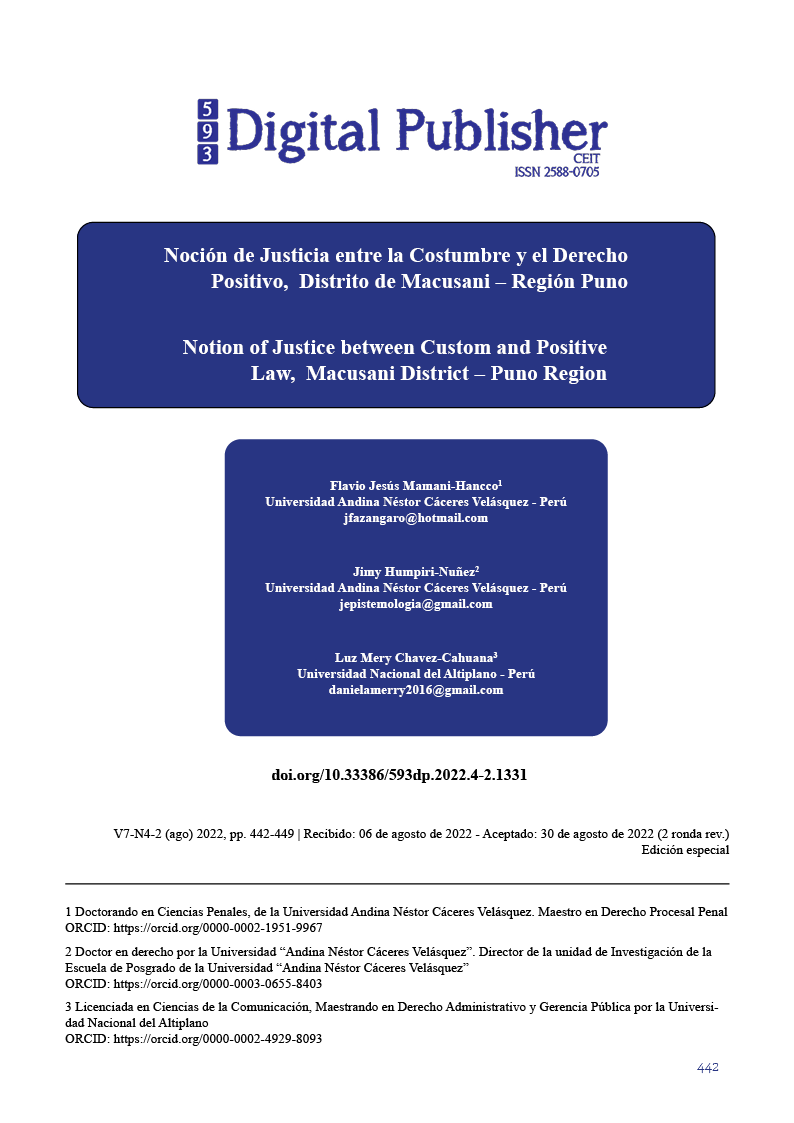Notion of Justice between Custom and Positive Law, Macusani District – Puno Region
Main Article Content
Abstract
The present research work responds to the latent problem in the Puno region, especially in the Macusani district, on the notion of justice between custom and positive law, as a result of which the objective was to analyze the notion of justice that residents present between custom and positive law in the district of Macusani - Puno Region, to achieve this objective I conducted a qualitative approach research because it sought to know the perception regarding the function of the administration of justice according to the settlers in the district of Macusani - Puno Region, for this a direct interview was applied to the designated settlers, an intentional sample of population groups was selected between patrolmen, settlers, prosecutors and judges. Once the investigation was developed, it was evidenced that the custom or customary law still prevails over time, therefore, it constitutes a form of justice in the district of Macusani, however, it is agreed that the positive law is more effective at These are cases that go against the fundamental rights of the person despite the administrative bureaucracy that burdens them. Therefore, today the Customary Law is still considered the most effective, less expensive and less lengthy way of administering justice than the Positive Law in the administration of justice with regard to daily and minor crimes that occur in the district. from Macusani, Puno region
Downloads
Article Details

This work is licensed under a Creative Commons Attribution-NonCommercial-ShareAlike 4.0 International License.
1. Derechos de autor
Las obras que se publican en 593 Digital Publisher CEIT están sujetas a los siguientes términos:
1.1. 593 Digital Publisher CEIT, conserva los derechos patrimoniales (copyright) de las obras publicadas, favorece y permite la reutilización de las mismas bajo la licencia Licencia Creative Commons 4.0 de Reconocimiento-NoComercial-CompartirIgual 4.0, por lo cual se pueden copiar, usar, difundir, transmitir y exponer públicamente, siempre que:
1.1.a. Se cite la autoría y fuente original de su publicación (revista, editorial, URL).
1.1.b. No se usen para fines comerciales u onerosos.
1.1.c. Se mencione la existencia y especificaciones de esta licencia de uso.
References
Bazán Cerdán, F. (2015). Estado del arte del derecho consuetudinario: El caso de Perú. Revista IIDH, 51–82. https://www.corteidh.or.cr/tablas/r08062-2.pdf
Carrasco Díaz, S. (2005). Metodología de la Investigación Científica. Editorial San Marcos.
Castillo Gallardo, M. (2009). Pueblos Indígenas y Derecho Consuetudinario. Un Debate Sobre las Teorías del Multiculturalismo. Nueva Antropología A.C. México, XXII(71), 13–29. https://revistas-colaboracion.juridicas.unam.mx/index.php/nueva-antropologia/article/view/15077
Gargarella, R. (2018). Sobre el “nuevo constitucionalismo latinoamericano.” Revista Uruguaya de Ciencia Política, 1(27), 109–129. https://doi.org/10.26851/rucp.27.5
Hernández Sampieri, R., Férnadez Collado, C., & Baptista, M. del P. (2014). Metodogología de la Investigación (Sexta). McGraw - Hill.
Kelsen, H. (2008). La doctrina del derecho natural y el positivismo jurídico. Revista Sobre La Enseñanza Del Derecho, 6(12), 183–198. http://www.derecho.uba.ar/publicaciones/rev_academia/revistas/12/la-doctrina-del-derecho-natural-y-el-positivismo-juridico.pdf
Monje Álvarez, A. (2011). Metodología de la Investigación Cuantitativa y Cualitativa - Guía didáctica. Universidad Surcolombiana.
Ollero, A. (2012). Todos de acuerdo: sólo es derecho el derecho positivo. In Homenaje al profesor Jose Antonio Escudero (Primera ed). Editorial Complutense S.A



